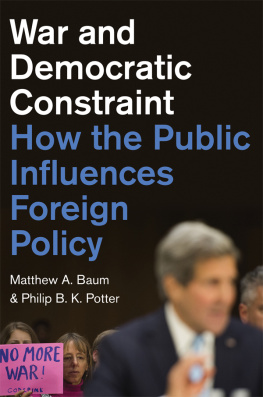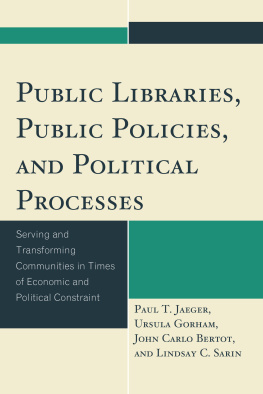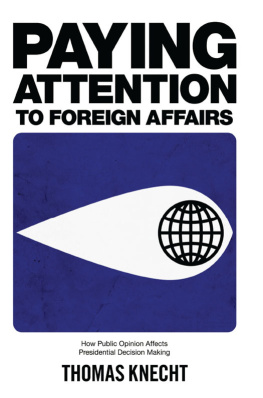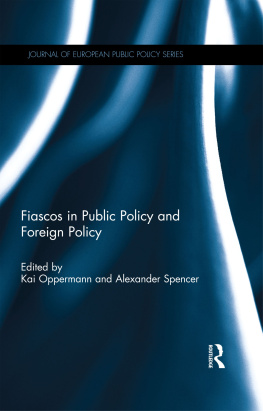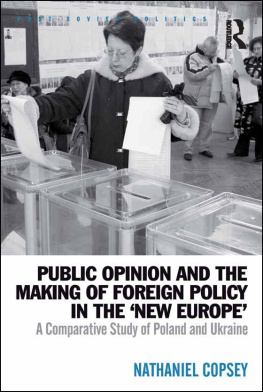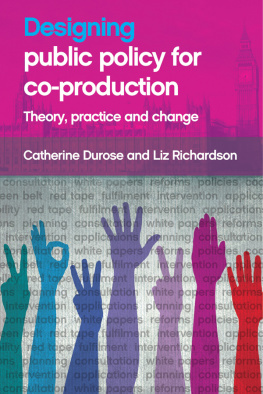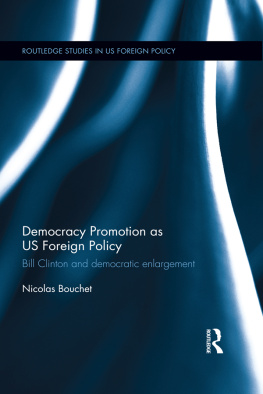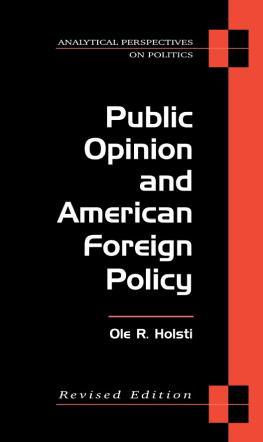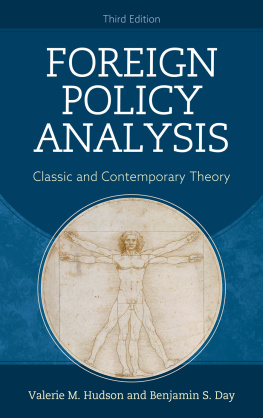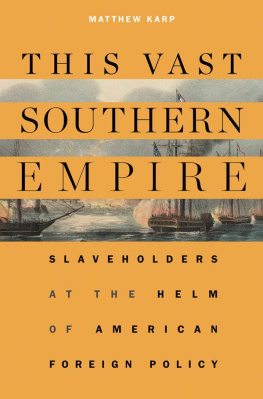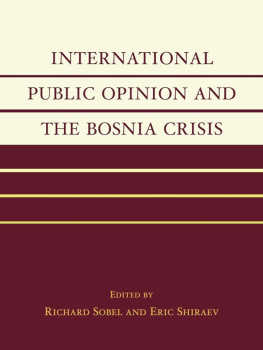War and Democratic Constraint
War and Democratic Constraint
How the Public Influences Foreign Policy
Matthew A. Baum
Philip B. K. Potter
PRINCETON UNIVERSITY PRESS
Princeton and Oxford
Copyright 2015 by Princeton University Press
Published by Princeton University Press, 41 William Street, Princeton, New Jersey 08540
In the United Kingdom: Princeton University Press, 6 Oxford Street, Woodstock, Oxfordshire OX20 1TW
press.princeton.edu
Jacket image: CodePink protester Medea Benjamin holds up an anti-war placard as US secretary of state John Kerry arrives to testify before the Senate Foreign Relations Committee on Capitol Hill in Washington, DC, December 9, 2014.
Photograph Jim Watson / AFP / Getty Images.
All Rights Reserved
Library of Congress Cataloging-in-Publication Data
Baum, Matthew, 1965
War and democratic constraint : how the public influences foreign policy / Matthew A. Baum, Philip B. K. Potter.
pages cm
Includes bibliographical references and index.
ISBN 978-0-691-16498-4 (hardback) ISBN 978-0-691-16523-3 (paper)
1. International relationsPublic opinion. 2. International relationsDecision makingCitizen participation. 3. Political participation. I. Potter, Philip B. K. II. Title.
JZ1305.B384 2015
327.1dc23
2014028841
British Library Cataloging-in-Publication Data is available
This book has been composed in Minon Pro
Printed on acid-free paper.
Printed in the United States of America
1 3 5 7 9 10 8 6 4 2
To my father, Richard Denis Baum
And to my kids, Ta and Alec
My circle of lifeM.A.B.
For Rachel, my best friend through thick and thin
And Hazel, who puts everything else in contextP.B.K.P.
CONTENTS
ACKNOWLEDGMENTS
Having reached the end of this journey, we begin by taking a step back to acknowledge the people who helped us to our final destination, such as it is. In this instance, the road has been long, winding, and uncertain, with many unexpected forks along the way. Progress has not always been smooth. The first recognizable kernel of the final product appeared a full decade ago, in a 2004 conference paper. The two illustrious discussantsLarry Bartels and Ken Schultzcommented something along the lines of really cool results; great that they support all the hypotheses; but we dont believe any of it.
While disappointing, the message was both apt and delivered with grace and constructive intent. As painful as the medicine was to swallow, if it hadnt been administered this book would not exist in its current form. For their honesty and thoughtfulness, the authors are grateful to Messrs. Bartels and Schultz. Their double-barreled rebuke led directly back to the drawing board (no passing Go, no collecting two hundred dollars, nor even a third-tier journal article) and ultimately to a series of productive collaborations between the authors over the past six years that have culminated in this volume.
A great many other individuals contributed to this project along the way. To begin with, for his methodological insights, creativity, and tireless work ethic on the news content analysis data employed in , we thank Yuri Zhukov, who began as a research assistant and quickly became a valued collaborator. For additional research assistance, we are grateful to Kuyoun Chung, Jamie Georgia, Shuhei Kurizaki, Claire Lehnen, Peter Li, Rohan Mehta, Alan Potter, Daniel Quan, Kristin Van Ausdal, and Michael Yates. For their thoughtful comments and feedback on drafts of the manuscript, individual chapters, theoretical or empirical approaches, or just random thoughts, we thank Jamie Druckman, Julia Gray, Tim Groeling, Michael Horowitz, Patrick James, Stephen Kosack, Jonathan Ladd, Tarek Masoud, Quinton Mayne, Lorelei Moosbrugger, Ryan Sheely, and Marc Trachtenberg. We also wish to thank the participants at workshops and seminars at UCLA, Stanford, Duke, Texas A&M, the University of Texas, Austin, the University of Michigan, the University of Virginia, and Harvard.
Various stages of this research were financially supported by grants from the UCLA Academic Senate, the Harvard Kennedy School, the International Policy Center at the University of Michigan, and the Weatherhead Center for International Affairs at Harvard University. All that said, for better or worse we are entirely responsible for the results of this endeavor. As Frank Sinatra famously sang (pardon the paraphrasing), we did it our way. And as Rodney Dangerfield slightly less famously said in response to Sinatra, What other way is there to do it?
Finally, we turn to the most important people. From Matt: I wish to thank my daughter Ta for her wit, kindness, and creativity, and for her uncanny ability to always make me laugh, and my son Alec for his limitless energy and joie de vivre. Though they dont realize it, this is where I find meaning every day. Finally, I also wish to dedicate this book to my father, Richard Baum, for teaching me how to laugh, write, persevere, throw a curveball, and always look on the bright side of life . From Phil: I thank my wife Rachel for her unfailing encouragement and love. She supported this project wholeheartedly right when her own academic career was heating up, and without her help this book would not have been possible. By extension, our daughter Hazel has had to put up with too much parental typing, but has been a constant source of joy and a reminder of what is really important in life. My hope is that she will not remember her contributions to this project, but I thank her nonetheless.
War and Democratic Constraint
Introduction: Looking for Democratic Constraint
In February 2003, British citizens opposed to the war in Iraq held the largest public demonstration ever seen in the United Kingdom. The protest brought London to a standstillno mean feat in a country with a long and storied tradition of public protest. In the three months preceding the war, only a third of the British public on average supported a military attack on Iraq, compared to nearly half (47 percent) opposing it. Public support bottomed out in the month prior to the war (February 2003), falling to 29 percent, with opposition rising to 52 percent. Indeed, as late as March 16, four days before the US-led invasion, 54 percent of the British public considered war against Iraq unjustified, while only 30 percent considered it justified.
Despite strong public opposition, Tony Blaira Labour prime minister whose left-of-center politics made him no obvious ideological ally to Republican US President George W. Bushproceeded to commit forty-five thousand troops to the conflict. Blair maintained that presencea force second in number only to that of the United Statesin the face of opposition that intensified in the years that followed. In short, despite substantial opposition from his own electorate, Blair prioritized the strategic relationship with the United States, which was pushing very hard for contributions to its coalition of the willing.
The British public was not alone in disapproving of the Iraq War. Prior to the wars outbreak, an overall average of two-thirds of respondents across sixty-two countries surveyedin some cases over 90 percentopposed a military attack on Iraq. Protests of comparable magnitude to those in London sprang up in many Western countries in the first half of 2003, but the domestic responses to them varied widely. Canadaa country with equally deep cultural, military, and financial ties to the United Stateswithheld support for the conflict, as did France, a long-standing ally. Both cited domestic opposition as a primary reason. Italy and Spain initially committed forces, but withdrew them in the face of the same sort of mounting opposition that Blair withstood.

